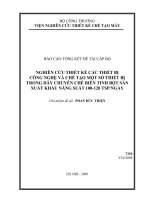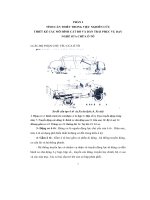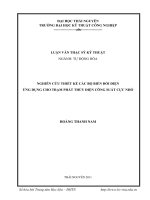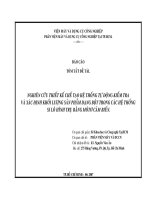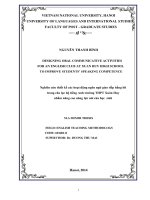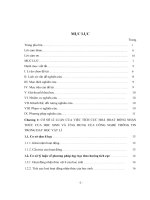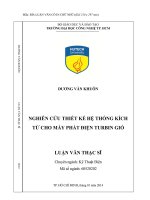- Trang chủ >>
- Các nước châu Á >>
- Ấn Độ.
NGHIÊN CỨU THIẾT KẾ CÁC BÀI HỌC TỪ VỰNG DỰA TRÊN ỨNG DỤNG WEB QUIZLET VÀ EDMODO
Bạn đang xem bản rút gọn của tài liệu. Xem và tải ngay bản đầy đủ của tài liệu tại đây (459.06 KB, 6 trang )
<span class='text_page_counter'>(1)</span><div class='page_container' data-page=1>
BLENDING QUIZLET AND EDMODO FOR DESIGNING
ENGLISH VOCABULARY PRACTICES: AN EXPERIMENTAL STUDY
Tran Minh Thanh1*<sub>, Nguyen Thi Bich Ngoc</sub>2<sub>, Nguyen Thuy Linh</sub>1
1<sub>TNU - University of Information and Communication Technology </sub>
2 <sub>TNU -</sub><sub>School of Foreign Languages </sub>
SUMMARY
In ESL learning, successful English vocabulary learning is a vital part of acquiring English.
However, the current teaching and learning English vocabulary in University of Information and
Communication Technology gained little success due to the traditional face-to-face instruction
model and some limitations related to large class size, time constraints, students’ demotivation and
ability. In this experimental study, we presents meticulously the process to design the vocabulary
lessons on Quizlet and vocabulary reading practices on Edmodo website, and then experiment
these vocabulary learning activities on the experimental group. The result collected from pre-test
and post-test reveals that there is a significant improvement in vocabulary knowledge in
experimental group in comparison with the control one. This study is a useful source of reference
for those keen on applying ICT for vocabulary teaching and learning in particular and in English
education in general.
Keyword: Quizlet, Edmodo, vocabulary learning, experimental research, English vocabulary
INTRODUCTION *
Most linguists, language teachers and learners
are aware that vocabulary is the vital
component of learning a new language.
Vocabulary is like bricks used to build up a
building. One cannot learn a language without
learning vocabulary. Therefore, teaching and
learning vocabulary has been the central part
of language education. In the University of
Information and Communication Technology
(ICTU), though much effort has been made
by English teachers and students to enhance
the effectiveness of English vocabulary
teaching and learning, the progress is rather
limited. According to statistics declared by
Division of Testing and Educational Quality
Assurance, a vast number of students (up to
46%) get mark D or F for the final English
exams [1]. This poor learning outcome is due
to a number of reasons which are both
objective and subjective. Objectively, the
average number of students in each English
class is 40 students which are really big for an
English class, and the students themselves
possess quite diverse levels of English
proficiency. As a result, teachers with the
limited in-class time generally cannot take
*<sub>Tel: 0979.046.855; Email: </sub>
</div>
<span class='text_page_counter'>(2)</span><div class='page_container' data-page=2>
for educational change and reform [2]. Quizlet
is an interactive mobile and web-based study
application that allows students to study
vocabulary via learning tools and games. It
trains students via flashcards and various
games and tests. It is particularly suitable for
designing vocabulary learning activity.
Edmodo is an educational technology
company offering a communication,
collaboration, and coaching platform to
K-12 schools and teachers. The Edmodo
network enables teachers to share content,
distribute quizzes, assignments, and manage
communication with students, colleagues, and
parents. Edmodo is very teacher-centric in
their design and philosophy: students and
parents can only join Edmodo if invited to do
so by a teacher. Teachers and students spend
large amounts of time on the platform, both in
and out of the classroom.
Inspired by the solution and realizing that the
above two technological tools can be a
answer to the current problem facing teachers
and students, the ideas to blend the websites
were outlined. An experiment on designing
the vocabulary learning lessons and practices
using Quizlet and Edmodo was done and
applied to students to improve the
effectiveness of vocabulary learning in
particular and English education in general.
LITERATURE REVIEW
Vocabulary learning has been a great
challenge for both teachers and students
because there hasn’t been enough focus on
vocabulary instruction in ESL class and
many teachers employed a traditional
approach to teach vocabulary. However,
with the growing number of interactive
learning tools, there has been a breakthrough
in vocabulary learning process and students
have become active participants of this
process. Experience has shown that
integrating these tools into vocabulary
instruction has not only given learners the
greatest opportunity to learn vocabulary
better but also contributed considerably to
their autonomy. Quizlet is one of those
interactive tools that is quite feasible to
implement in class and greatly assists
students in their journey of vocabulary
acquisition.
Quizlet (quizlet.com) is a website that allows
learners to create and use online flashcards to
learn vocabulary. Quizlet can be used on both
computers and mobile phones. Thus, students
will be more flexible and active in learning
and reviewing new vocabulary. Recognizing
the relevance and convenience, many scholars
and practitioners of language teaching around
the world used Quizlet to teach vocabulary to
students Sevgi Şahin [3], Gilbert Dizon [4],
Christine Bauer-Ramazani [5], and Henry
Foster [6]. These studies have all pointed out
Quizlet is greatly beneficial to students to
improve their vocabulary as well as their
autonomy in learning.
In Vietnam, although Quizlet has been used
by many people to teach language, but the
number of users is limited [7]. In particular,
the research on the effectiveness of using
combination of Quizlet and Edmodo
applications is not available.
At ICTU, An D.T.H [8] has conducted a
project to pilot and implement an integrated
website for teaching and learning English.
However, the website is restricted to level A2
and has not yet deeply supported for students
to study vocabulary. Moreover, the cost for
renting a server is somehow expensive.
METHODOLOGY
Research questions
</div>
<span class='text_page_counter'>(3)</span><div class='page_container' data-page=3>
Participants
The subject of the study is two groups of
students in two different classes of 40
students each: control group and experimental
group. Each group had 20 selected students
who had completed three prerequisite English
courses (English 1, English 2 and English 3),
and now doing the course in English 4. They
all are between A2 and B1 level of English
language proficiency (CEFR). The researcher
is the instructor of both classes.
Data collection instrument
To collect the data, the author used
vocabulary pre-test and post-test which are
adapted from the APTIS Vocabulary and
Grammar Test. The adapted test consists of a
total of 20 target words divided into 04
sections following three formats: word usage,
word matching, and word pair or word
combination. The words’ levels were checked
on
to achieve the validity of the test. 6 out of 20
target words are at A2 level, and the rest are
at B1 level. The first versions of both pre-test
and post-test were converted to Web format
and piloted on two other small groups of 20
students each at the same level in order to
refine them. Based on students’ comment,
changes were made in the wording of several
items. Cronbach’s alpha for each a priori
construct in both groups was .76 above,
suggesting that the reliability of the
instrument was satisfactory.
The pre-test then was launched to both groups.
The followed experiment underwent two
main activities.
Activity 1: Designing vocabulary lessons on
Quizlet
This activity has three steps:
+ Step 1: Making target wordlists
To be aligned with the syllabus and achieve
the aim of the study, the author selected five
popular topics in the coursebook English
Unlimited B1 namely Sports and Exercises,
Shopping, Weather, Tourism and Feelings
respectively. The author then selected the
target words to make a full list. The levels of
the selected words for each topic were
checked on vocabulary.englishprofile.org
ranging from A2 to B1 according to CEFR
before uploading to Quizlet. Each complete
wordlist was made up of 50 English words.
+ Step 2: Uploading the wordlists to Quizlet
After the five wordlists were made, the author
uploaded them to Quizlet. This consists of
several sub-activities including providing
Vietnamese meaning and selecting the
presenting images or photos the words which
can be visualized.
+ Step 3: Distributing links of wordlists to
students
The final step in this activity was to distribute
all five links to students in the experimental
group. The teacher guided students how to
use each vocabulary learning activity on
Quizlet, such as using flashcard, writing,
spelling, pronouncing and playing games.
Noticed that these links should be fully
distributed to students because some of active
students even learned the new vocabulary
outside the class before the official in-class
lesson took place.
Activity 2: Designing vocabulary reading
practices on Edmodo.
Corresponding to five vocabulary wordlists,
the reading practices with linguistic input
based on these topics were designed on
Edmodo. This activity also has three steps.
+ Step 1: Selecting the reading practices and
format types of questions
</div>
<span class='text_page_counter'>(4)</span><div class='page_container' data-page=4>
but still remained challenging to students.
The questions designed around the reading
texts follow some types of formats, such as
true – false, gap-filling, matching, multiple
choice, and open-ended questions. In total,
30 reading practices with 432 questions had
been completed.
Step 2: Uploading the reading practices to
Edmodo
After the reading practices had been
completed, they were uploaded to Edmodo.
Technically, in this step the selection of
question types on Edmodo was the same as
the design on the readily-prepared reading
practices.
Step 3: Assigning the reading practices for
students
In contrast with the distribution of all
vocabulary links, the assignment of reading
practices was made after the students had
studied the English lessons. After every
lesson, the teacher assigned three reading
practices of the same topics for students to do
them at home as the homework. The end
result of the reading practices on Edmodo was
calculated as one progress test. This
assessment criterion is of importance because
it created the extrinsic motivation for students
to learn seriously.
Data collection procedure
The pre-test was launched to both English
classes at the beginning of the semester. The
results were collected and analyzed to form
control group and experimental group with
equal scores.
After finishing the course and the
experimental period, the post-test was
launched to both control group and
experimental group. Finally, the results of the
both tests were analyzed and compared.
FINDINGS
The results of the Pre-test
The pre-test was administered to both two
classes of students (40 students in each).
Then, to make samples, students with similar
scores were taken out of to form an
experimental and a control group. The
specific pre-test results of both groups after
sampling were the following.
Table 1. Students’ pre-test scores
The percentage (%) of students with
pre-test scores of
Scores
Grp.
7.0 –
7.5
6.0 –
6.5
5.0 –
5.5
4.0 –
4.5 4.0
Con. 0 0 0 12 88
Exp. 0 0 0 13 87
It can be seen from Table 1 that the
percentages of students with similar scores is
quite the same in both groups. The pre-test
results also shown that the majority of
students (up to 88%) did not get high scores
below 4 out of 10 in their pre-tests. Even only
12% of them got 4.0 or 4.5, and none of them
got 5 or above. From analysis of the test data,
the 12% of students who got 4.0 or 4.5 had
correct answers for A2 vocabulary quizzes.
This result revealed that students’ vocabulary
knowledge was not very satisfactory, and this
can be an obstacle to their performance in
classroom in general.
The results of the Post-test
By the end of the semester, the post-test was
administered to both groups. The data driven
from post-test were presented below.
Table 2: Students’ post-test scores
The percentage (%) of students with
post-test scores of
Scores
Grp.
≥ 8.0 7.0 –
7.5
6.0 –
6.5
5.0 –
5.5
4.0 –
4.5 4.0
Con. 0 8 28 24 20 20
Exp. 20 24 44 12 0 0
</div>
<span class='text_page_counter'>(5)</span><div class='page_container' data-page=5>
of traditional in-class instruction. Also, the
number of student who got the scores of 6.0
– 6.5 and 7.0 – 7.5 had increased sharply to
44% for the former and 24% for the later.
Noticeably, in experimental group there
appeared 20% of students achieving the
scores of 8 or above whereas there were no
ones in control group getting 8.0 points or
above. The percentage of students who got
the scores of 6.0 – 6.5 and 7.0 – 7.5 in
control group was 28% and 8%, respectively.
In short, the study had clearly shown the
effectiveness of designing the vocabulary
practices using Quizlet and Edmodo in
improving the students’ vocabulary
knowledge.
CONCLUSION
Methods to teaching and learning English
vocabulary have been changing over the time.
Research have proved the application of ICT
in English vocabulary learning in particular
and in English education in general to be
effective. In this study, the application of
Quizlet and Edmodo in teaching and learning
English vocabulary proved to be an effective
and practical model for teachers of English to
apply in their similar setting. The study was
limited at assessing the increase in students’
vocabulary knowledge (meaning, usage and
collocation), it could explore the other aspects
of using the websites to the learners’
autonomy, the development of ICT skills,
challenges, and attitudes towards using ICT to
learn vocabulary.
In conclusion, the study have presented
meticulously the process to design the
vocabulary lessons on Quizlet and vocabulary
reading practices on Edmodo website, and
then experiment these vocabulary learning
activities on the experimental group. This is a
useful source of reference to teachers or
researchers of similar context.
Acknowledgements
The article is the scientific product of the
basis-level project entitled “A study on
designing vocabulary lessons on Quizlet and
Edmodo” coded T2018-07-07 financially
supported by TNU-University of Information
and Communication Technology.
REFERENCES
1. Division of Testing and Educational Quality
Assurance – ICTU (2017), Summary report on
academic results of academic year 2016 – 2017,
an internal used document.
2. Fu J. S (2013), “ICT in Education: A Critical
Literature Review and Its Implications”.
International Journal of Education and Development
using Information and Communication Technology
(IJEDICT), 9(1), pp. 112-125
3. Sevgi Şahin (2017), An innovative technique of
teaching vocabulary: Quizlet, Retrieved from:
-technique-of-teaching-vocabulary-quizlet/
4. Gilbert Dizon (2016), “Action Research: Using
Quizlet for Mobile Vocabulary Learning and
Retention”, Proceedings of TESOL 2015
International Convention and English Language
Expo, Metro Toronto Convention Centre, 26 – 28
March 2015
5. Christine Bauer-Ramazani (2015),
“Research-Oriented Presentation: Action Research: Using
Quizlet for Mobile Vocabulary Learning and
Retention”, Recorded Presentation, 49th TESOL
Convention and Exhibition, Toronto, Canada,
March 26-29.
</div>
<span class='text_page_counter'>(6)</span><div class='page_container' data-page=6>
TÓM TẮT
NGHIÊN CỨU THIẾT KẾ CÁC BÀI HỌC TỪ VỰNG
DỰA TRÊN ỨNG DỤNG WEB QUIZLET VÀ EDMODO
Trần Minh Thành1*<sub>, Nguyễn Thị Bích Ngọc</sub>2<sub>, Nguyễn Thùy Linh</sub>1
1<sub>Trường Đại học Công nghệ Thông tin và Truyền thông – ĐH Thái Nguyên </sub>
2<sub>Khoa Ngoại ngữ - ĐH Thái Nguyên </sub>
Trong việc học tập tiếng Anh như là ngôn ngữ thứ 2, học từ vựng tiếng Anh thành công là một
phần thiết yếu để thụ đắc tiếng Anh. Tuy nhiên, tại trường Đại học Công nghệ Thông tin và
Truyền thông, việc dạy và học từ vựng tiếng Anh hiện tại đạt được ít thành cơng vì mơ hình học
tập trực tiếp (face-to-face) truyền thống và một số hạn chế liên quan tới số lượng sinh viên trong
lớp học lớn, áp lực hạn chế về thời gian, sự mất hứng học và năng lực của sinh viên. Trong nghiên
cứu này, chúng tôi hướng dẫn một cách tỷ mỷ quá trình thiết kế các bài học từ vựng và luyện tập
từ vựng trên 02 ứng dụng web là Quizlet và Edmodo, và thực nghiệm những hoạt động học từ
vựng này trên nhóm thực nghiệm. Kết quả nghiên cứu thu thu thập được từ bài pre-test và post-test
chỉ ra rằng sinh viên nhóm thực nghiệm có sự tiến bộ đáng kể hơn trong việc học từ vựng tiếng
Anh hơn so với sinh viên khơng thuộc nhóm thực nghiệm. Nghiên cứu này là nguồn tham khảo
hữu ích cho những người đam mê giảng dạy và học tập từ vựng tiếng Anh nói riêng và đào tạo
tiếng Anh nói chung.
Từ khóa: Quizlet, Edmodo, học từ vựng, nghiên cứu thực nghiệm, từ vựng tiếng Anh
Ngày nhận bài: 22/8/2018; Ngày phản biện: 17/9/2018; Ngày duyệt đăng: 28/9/2018
</div>
<!--links-->
